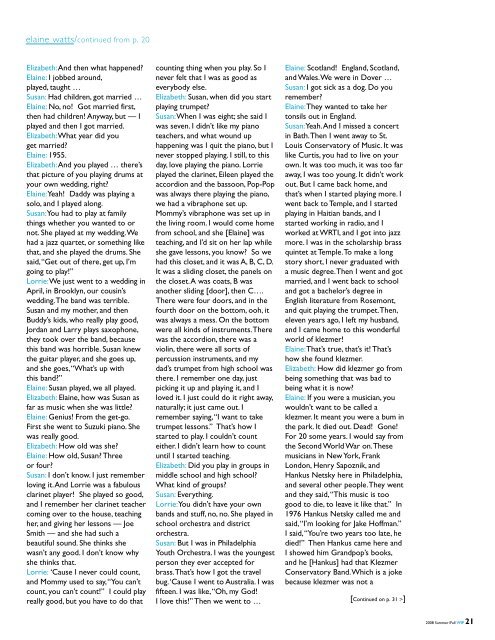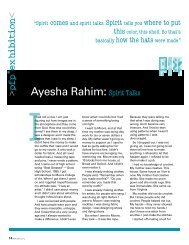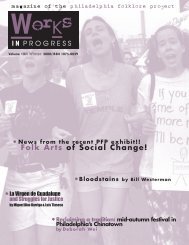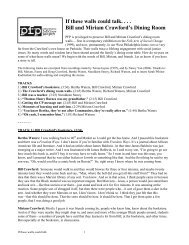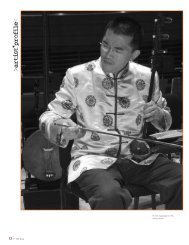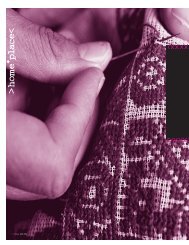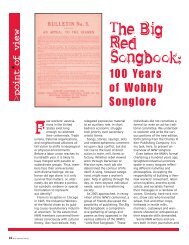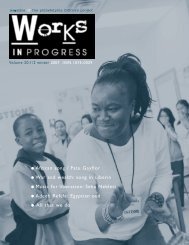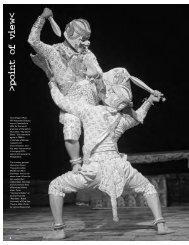View PDF - Philadelphia Folklore Project
View PDF - Philadelphia Folklore Project
View PDF - Philadelphia Folklore Project
Create successful ePaper yourself
Turn your PDF publications into a flip-book with our unique Google optimized e-Paper software.
elaine watts/continued from p. 20<br />
Elizabeth: And then what happened<br />
Elaine: I jobbed around,<br />
played, taught …<br />
Susan: Had children, got married …<br />
Elaine: No, no! Got married first,<br />
then had children! Anyway, but — I<br />
played and then I got married.<br />
Elizabeth: What year did you<br />
get married<br />
Elaine: 1955.<br />
Elizabeth:And you played … there’s<br />
that picture of you playing drums at<br />
your own wedding, right<br />
Elaine: Yeah! Daddy was playing a<br />
solo, and I played along.<br />
Susan:You had to play at family<br />
things whether you wanted to or<br />
not. She played at my wedding. We<br />
had a jazz quartet, or something like<br />
that, and she played the drums. She<br />
said, “Get out of there, get up, I’m<br />
going to play!”<br />
Lorrie:We just went to a wedding in<br />
April, in Brooklyn, our cousin’s<br />
wedding. The band was terrible.<br />
Susan and my mother, and then<br />
Buddy’s kids, who really play good,<br />
Jordan and Larry plays saxophone,<br />
they took over the band, because<br />
this band was horrible. Susan knew<br />
the guitar player, and she goes up,<br />
and she goes, “What’s up with<br />
this band”<br />
Elaine: Susan played, we all played.<br />
Elizabeth: Elaine, how was Susan as<br />
far as music when she was little<br />
Elaine: Genius! From the get-go.<br />
First she went to Suzuki piano. She<br />
was really good.<br />
Elizabeth: How old was she<br />
Elaine: How old, Susan Three<br />
or four<br />
Susan: I don’t know. I just remember<br />
loving it. And Lorrie was a fabulous<br />
clarinet player! She played so good,<br />
and I remember her clarinet teacher<br />
coming over to the house, teaching<br />
her, and giving her lessons — Joe<br />
Smith — and she had such a<br />
beautiful sound. She thinks she<br />
wasn’t any good. I don’t know why<br />
she thinks that.<br />
Lorrie: ‘Cause I never could count,<br />
and Mommy used to say, “You can’t<br />
count, you can’t count!” I could play<br />
really good, but you have to do that<br />
counting thing when you play. So I<br />
never felt that I was as good as<br />
everybody else.<br />
Elizabeth: Susan, when did you start<br />
playing trumpet<br />
Susan: When I was eight; she said I<br />
was seven. I didn’t like my piano<br />
teachers, and what wound up<br />
happening was I quit the piano, but I<br />
never stopped playing. I still, to this<br />
day, love playing the piano. Lorrie<br />
played the clarinet, Eileen played the<br />
accordion and the bassoon, Pop-Pop<br />
was always there playing the piano,<br />
we had a vibraphone set up.<br />
Mommy’s vibraphone was set up in<br />
the living room. I would come home<br />
from school, and she [Elaine] was<br />
teaching, and I’d sit on her lap while<br />
she gave lessons, you know So we<br />
had this closet, and it was A, B, C, D.<br />
It was a sliding closet, the panels on<br />
the closet. A was coats, B was<br />
another sliding [door], then C….<br />
There were four doors, and in the<br />
fourth door on the bottom, ooh, it<br />
was always a mess. On the bottom<br />
were all kinds of instruments. There<br />
was the accordion, there was a<br />
violin, there were all sorts of<br />
percussion instruments, and my<br />
dad’s trumpet from high school was<br />
there. I remember one day, just<br />
picking it up and playing it, and I<br />
loved it. I just could do it right away,<br />
naturally; it just came out. I<br />
remember saying, “I want to take<br />
trumpet lessons.” That’s how I<br />
started to play. I couldn’t count<br />
either. I didn’t learn how to count<br />
until I started teaching.<br />
Elizabeth: Did you play in groups in<br />
middle school and high school<br />
What kind of groups<br />
Susan: Everything.<br />
Lorrie: You didn’t have your own<br />
bands and stuff, no, no. She played in<br />
school orchestra and district<br />
orchestra.<br />
Susan: But I was in <strong>Philadelphia</strong><br />
Youth Orchestra. I was the youngest<br />
person they ever accepted for<br />
brass. That’s how I got the travel<br />
bug. ‘Cause I went to Australia. I was<br />
fifteen. I was like, “Oh, my God!<br />
I love this!” Then we went to …<br />
Elaine: Scotland! England, Scotland,<br />
and Wales. We were in Dover …<br />
Susan: I got sick as a dog. Do you<br />
remember<br />
Elaine: They wanted to take her<br />
tonsils out in England.<br />
Susan: Yeah. And I missed a concert<br />
in Bath. Then I went away to St.<br />
Louis Conservatory of Music. It was<br />
like Curtis, you had to live on your<br />
own. It was too much, it was too far<br />
away, I was too young. It didn’t work<br />
out. But I came back home, and<br />
that’s when I started playing more. I<br />
went back to Temple, and I started<br />
playing in Haitian bands, and I<br />
started working in radio, and I<br />
worked at WRTI, and I got into jazz<br />
more. I was in the scholarship brass<br />
quintet at Temple. To make a long<br />
story short, I never graduated with<br />
a music degree. Then I went and got<br />
married, and I went back to school<br />
and got a bachelor’s degree in<br />
English literature from Rosemont,<br />
and quit playing the trumpet. Then,<br />
eleven years ago, I left my husband,<br />
and I came home to this wonderful<br />
world of klezmer!<br />
Elaine:That’s true, that’s it! That’s<br />
how she found klezmer.<br />
Elizabeth: How did klezmer go from<br />
being something that was bad to<br />
being what it is now<br />
Elaine: If you were a musician, you<br />
wouldn’t want to be called a<br />
klezmer. It meant you were a bum in<br />
the park. It died out. Dead! Gone!<br />
For 20 some years. I would say from<br />
the Second World War on. These<br />
musicians in New York, Frank<br />
London, Henry Sapoznik, and<br />
Hankus Netsky here in <strong>Philadelphia</strong>,<br />
and several other people. They went<br />
and they said, “This music is too<br />
good to die, to leave it like that.” In<br />
1976 Hankus Netsky called me and<br />
said, “I’m looking for Jake Hoffman.”<br />
I said, “You’re two years too late, he<br />
died!” Then Hankus came here and<br />
I showed him Grandpop’s books,<br />
and he [Hankus] had that Klezmer<br />
Conservatory Band. Which is a joke<br />
because klezmer was not a<br />
[Continued on p. 31 >]<br />
2008 Summer /Fall WIP 21


